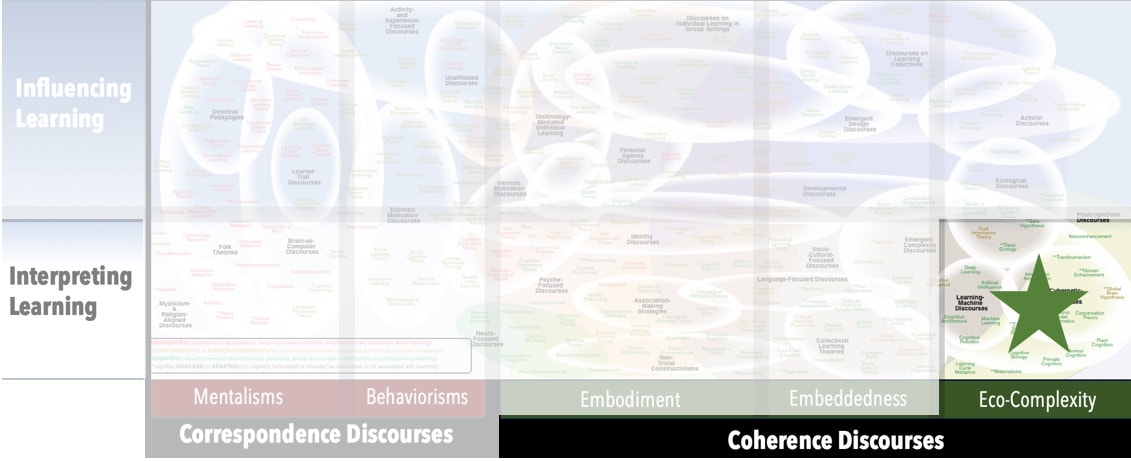Focus
Surpassing current human limitationsPrincipal Metaphors
- Knowledge is … scope of possibilities (for thinking and acting)
- Knowing is … situationally appropriate action
- Learner is … a technologically augmented individual
- Learning is … technologically augmenting one’s repertoire of possibilities
- Teaching is … N/A
Originated
1990sSynopsis
Transhumanism addresses the development, use, and distribution of technologies to enhance intellect and physiology. Oriented by a belief that eventual benefits will outweigh current health, social, ethical, and other issues and dangers, most proponents of Transhumanism envision a future in which possibility is so greatly increased by Directed Evolution (vs. natural evolution) that humans will become fundamentally different sorts of beings:- Directed Evolution (Participant Evolution) (Manfred Clynes, Nathan Kline, 1960s) – within Transhumanism, laboratory-based efforts to mimic and manipulate biological evolutionary processes, with the aim of controlling human evolution – that is, the hacking of evolutionary processes to redesign and redefine human possibility
Associated discourses, constructs, and activities include:
- Body Hacking (Biohacking) (2010s) – the use of cybernetic devices, biochemicals, or other technical means to transform the body’s functions and capabilities
- Cyborg (Manfred Clynes, 1960s) – a portmanteau of cybernetic and organism to describe one with both biomechanical and organic body parts
- Cyborg Anthropology – an area of inquiry that brings perspectives from Anthropology to bear on the interactions of biology and technology in human development at the social and cultural levels
- Grinders (Grinder Movement) (2010s) – a community of body hackers (see Body Hacking, above), focused especially on implantation of cybernetic devices
- Neurohacking (Neurocybernetic Augmentation) – a type of Body Hacking (see above) focused on the brain, aimed at improving reflexes, ameliorating mental disorders, improving memory, and accelerating learning
- Noosphere (Noösphere) (Vladimir Vernadsky, 1990s) – derived from the Greek νόος σφαίρα “sense + sphere,” the suggestion that humanity’s scientific and philosophical activities have in effect created a fundamentally new, evolutionary-geological layer to the biosphere
See also Human Enhancement and Intelligence Amplification.
Commentary
As might be anticipated, concerns around and criticisms of Transhumanism tend to revolve around ethical matters – and many of the issues raised are difficult to disentangle from ideological positionings. For example, some critics assert a moral value on preserving the “natural,” some express worries over the emergence of new categories of inequality among humans, and some lament the potential loss of human identity. More intense anxieties have been voiced around the dangers of humans attempting to “play God.”Authors and/or Prominent Influences
J.B.S. Haldane; Julian Huxley. Otherwise diffuse, with discussions dominated by futurists (e.g., Ray Kurzweil)Status as a Theory of Learning
The past century of theorizing about and inquiring into personal learning has prompted realizations that it is always and already distributed, situated, and technologically mediated. But it seems that such insights are only now starting to press into the realms of the popular and the commonsensical, propelled in large part by discussions related to Transhumanism. That is, Transhumanism and its associated discourses appear to be contributing to significant and pervasive reconsiderations of what theories of learning are all about. Thus, in a very pragmatic sense, Transhumanism is a theory of learning.Status as a Theory of Teaching
Transhumanism is not a theory of teaching, at least not in terms of any common interpretation of “teaching.” However, insofar as it envisions a means to dramatically elaborate human possibility, it might offer an entirely different way of thinking about what “teaching” is all about.Status as a Scientific Theory
Transhumanism is associated with an extensive, varied, and ever-accelerating accumulation of evidence.Subdiscourses:
- Body Hacking (Biohacking)
- Cyborg
- Cyborg Anthropology
- Directed Evolution (Participant Evolution)
- Grinders (Grinder Movement)
- Neurohacking (Neurocybernetic Augmentation)
- Noosphere (Noösphere)
Map Location

Please cite this article as:
Davis, B., & Francis, K. (2023). “Transhumanism” in Discourses on Learning in Education. https://learningdiscourses.com.
⇦ Back to Map
⇦ Back to List
